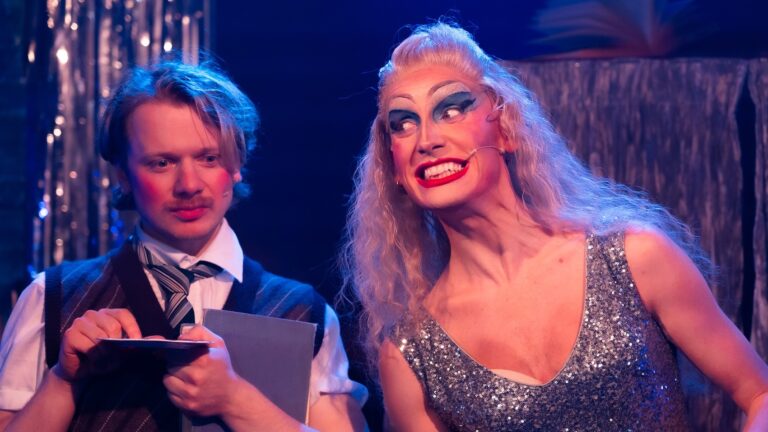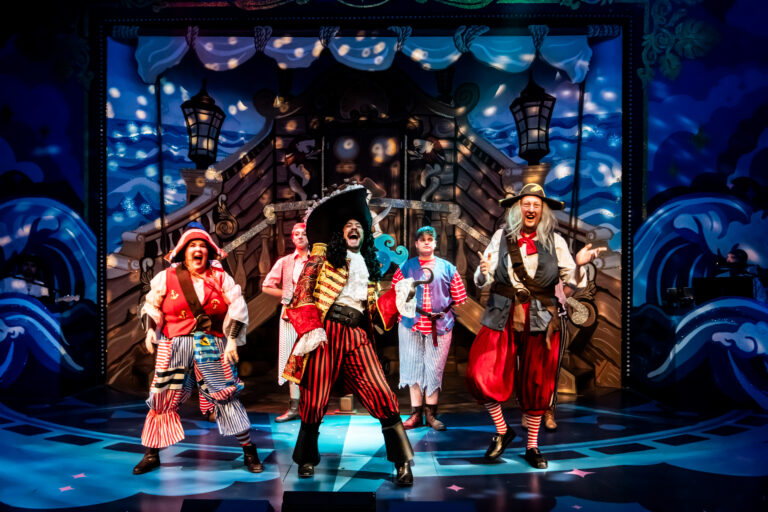“When you’re a star they let you do it”
Elle While’s production of Richard III at Shakespeare’s Globe is a frantic, creepy, modern-day satire of toxic masculinity, spearheaded by Michelle Terry (Globe Artistic Director) in the titular role, writes Mary Bradshaw.
Long before its opening night, the production was already the eye of a media and internet storm around the decision to cast an able-bodied actor as a character who describes himself as ‘deformed, unfinished’ in Shakespeare’s play. Most, if not all, of the textual references to his physique have also been cut.
Over the years, the consensus has been that Richard’s supposed disability (now proven to be scoliosis by archaeologists) was an outward sign of, and reason for, his inner evil. Elle While refreshingly shifts this narrative.
While encourages the audience to find signs of a domineering, abusive, corrupt personality not in somebody’s innate physique, but in what they do with their body.
Here, Michelle Terry’s Richard is defined by his lecherousness, not his disability. He dominates through body language: invading women’s personal space, grinding up against them, positioning himself centre-stage, where possible, and moving with a sickening groin-first swagger, bare chest puffed out.
He takes up space with the libidinous clothing of pompous, wealth-dripping celebrity: a silky bedroom kimono, a wide-shouldered and green-furred leather jacket, and hideous leather codpieces, bejewelled and spiked.
If this reminds you of any infamous sex offenders that hide in plain sight from atop a monied power hierarchy, you are not alone. At first I think of Jimmy Savile (perhaps Terry’s fringed peroxide wig has something to do with it), but as the play speeds along, Trumpism after Trumpism (including visual references to his ‘merch’ of gold trainers and baseball caps), makes the true object of caricature abundantly clear.
In a creepy, smooth drawl, Terry will quote Trump verbatim, like: “I just start kissing them… I just kiss. I don’t even wait. And when you’re a star they let you do it. You can do anything.”
It’s an apt comparison: parts of the original script could easily have been uttered by Trump, Saville, and many other sexual predators both on the world stage or in the audience’s own lives.
Richard’s justification to Lady Anne for killing her husband and her father-in-law, for instance, is: “Your beauty was the cause of that effect…”
It all seems to respect the play’s origins as a history play written under Tudor monarch Elizabeth I to bolster her reputation by demonising and satirising previous dynasties.
Of course, it is important that present-day predatory males are made a mockery of by this entirely female and non-binary identifying cast, by the riotous jazz music with its humorous sudden stops and starts, and by modern, irreverent choreography.
However, the production risks labouring the point. The audience is breathlessly whisked along by this frazzled satire. More space should be allowed to enable us to make our own connections between Richard and a scarily timeless toxic masculinity.
We become a little too distanced, in satire-mode, to be emotionally moved by the play. It is refreshing and empowering to laugh in the face of abusers who got away with things for far too long, to shove their artifice under the headlights, but not, perhaps, to look on apathetically at the abused. We begin to look as unflinchingly as Richard himself at the dead bodies of his many victims, thrown through a blood-splattered trap door.
The focus, here, is on laughing at the predator, not on identification with his victims.
Globe Theatre until 3 August
More information and booking: here






